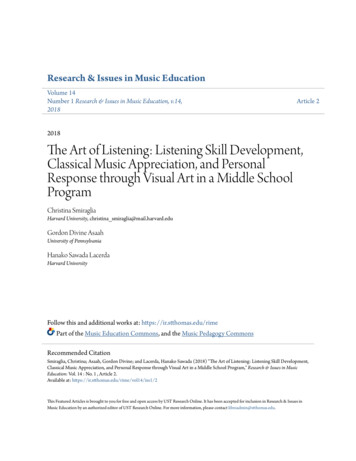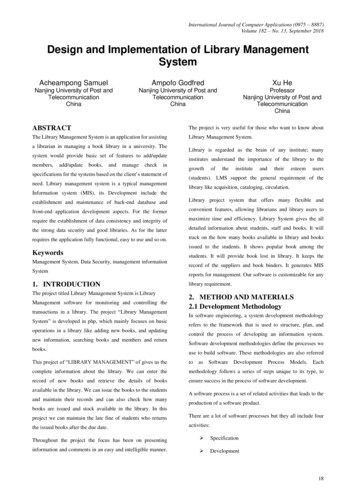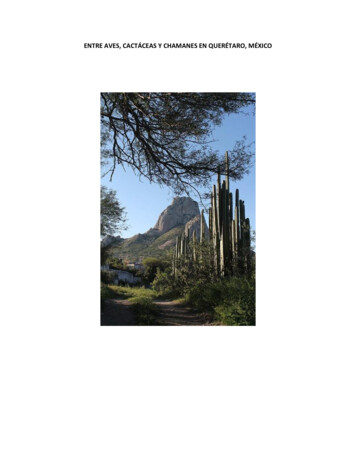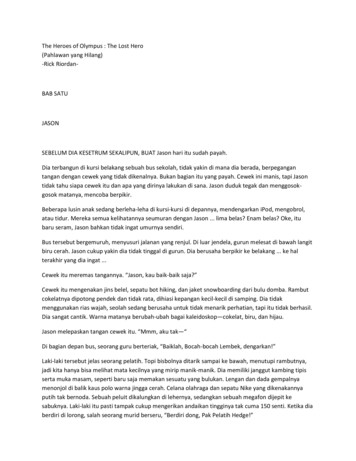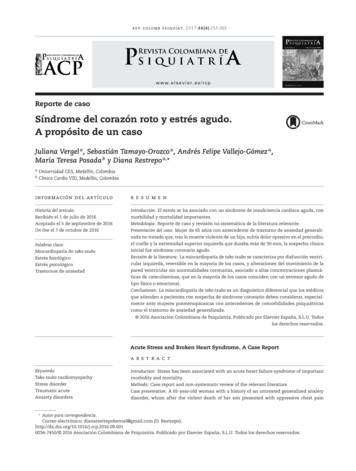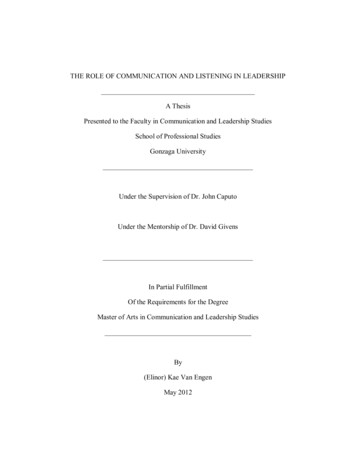
Transcription
202//204DRAFTASOFDIA BOOKSHELF ANDLISTENING LIBRARY2022
The appearance of a title and accompanying summary on this reading list do notimply or constitute an endorsement or an approval by the Defense IntelligenceAgency (DIA) of any of the products, services or opinions of the authors. However,these books contain thought-provoking ideas and viewpoints relevant to leadership,decision making and professionalism. The DIA bears no responsibility for the accuracy,legality or content of the books referenced in this reading list.
DIA CreedI am an officer of the Defense Intelligence Agency.I have taken an oath to support and defendThe Constitution of the United States of Americaand all for which it stands.Against all enemies, foreign and domestic.As a DIA officer, I pledge to provide premierintelligence to the warfighter;To communicate clearly, concisely, anddecisively in support of the policymaker;To speak truth to power and take ownershipin pursuit of our mission;And to safeguard the information withwhich I have been entrusted.As a DIA officer, I embody excellence, teamwork,integrity, initiative, and accountability.I will hold myself and my colleagues responsiblefor our actions and inactions.I will treat others with respect and professionalism;And I will encourage creativity, innovation,and a culture of trust.If I see a problem, I will find a solution.If I see a challenge, I will rise to it.I strive for excellence in all that I do.I am a DIA officer. I am DIA.
Page intentionally left blank.
“Books are a form of political action. Books are knowledge.Books are reflection. Books change your mind.”Toni MorrisonPulitzer and Nobel Prize-winning author“For me, I am driven by two main philosophies: know moretoday about the world than I knew yesterday and lessen thesuffering of others. You’d be surprised how far that gets you.”Neil deGrasse TysonAmerican author and science communicator“In the end, it is important to remember that we cannot becomewhat we need to be, by remaining what we are.”Max De PreeAmerican businessman and writer
TA B L E O F C O N T E N T S014GLOBAL ANALYSIS012034: A Novel of the Next World War902Chaos Under Heaven: Trump, Xi, and the Battle for the 21st Century903Complexity: The Emerging Science at the Edge of Order and Chaos904Destined for War: Can America and China Escape Thucydide's Trap?905Prisoners of Geography: Ten Maps that Tell You Everything You Need to Know About Global Politics1006Shields of the Republic: The Triumph and Peril of America’s Alliances1007The Looting Machine1008To Build a Better World1009We Have Been Harmonized1110The Shadow War1111Cybersecurity: Politics, Governance and Conflict in Cyberspace1112The Cybersecurity Dilemma: Hacking, Trust, and Fear Between Nations1113Cyber Strategy: The Evolving Character of Power and Coercion1214Cyber War versus Cyber Realities: Cyber Conflict in the International System1215The Decision to Attack: Military and Intelligence Cyber Decision-Making1216The Hacker and the State: Cyber Attacks and the New Normal of Geopolitics1217On Cyber: Towards an Operational Art for Cyber Conflict1318Jihadists of North Africa and the Sahel1319The Beirut Protocol1320Atlas Shrugged13BY ELLIOT ACKERMAN AND ADM. JAMES STAVRIDIS, USNBY JOSH ROGINBY M. MITCHELL WALDROPBY GRAHAM ALLISONBY TIM MARSHALLBY MIRA RAPP-HOOPERBY TOM BURGISBY PHILIP ZELIKOW AND CONDOLEEZA RICEBY K AI STRITTMATTERBY JIM SCUITTOBY DAMIEN VAN PUYVELDE AND A ARON F. BRANTLYBY BEN BUCHANANBY BRANDON VALERIANO, BENJAMIN JENSEN AND RYAN C. MANESSBY BRANDON VALERIANO AND RYAN C. MANESSBY A ARON FRANKLIN BRANTLYBY BEN BUCHANANBY GREGORY CONTI AND DAVID RAYMONDBY ALEXANDER THURSTONBY JOEL ROSENBERGBY AYN RANDGLOBAL ANALYSIS
TA B L E O F C O N T E N T S02HISTORY21A Peace to End All Peace: The Fall of the Ottoman Empire and the Creation of the Modern Middle East1522A World Lit Only by Fire1523All the Shah's Men1524America and Iran: A History: 1720 to the Present1525America, The Last Best Hope1626Becoming Kim Jong Un: A Former CIA Officer’s Insights into North Korea’s Enigmatic Young Dictator1627Countdown 19451628Covert Regime Change: America’s Secret Cold War1629Endurance: Shackleton's Incredible Voyage1730Fateful Triangle: How China shaped U.S.-India Relations during the Cold War1731For the President's Eyes Only: Secret Intelligence and the American Presidency from Washington to Bush1732Ghost Wars1733Intel Wars: The Secret History of the Fight Against Terror1834King Leopold's Ghost1835Sandworm: A New Era of Cyberwar and the Hunt for the Kremlin's Most Dangerous Hackers1836The Secret World: A History of Intelligence1837Four Hundred Souls1938The Light of Days: The Untold Story of Women Resistance Fighters in Hitler's Ghettos1939I Came As a Shadow19BY DAVID FROMKINBY WILLIAM MANCHESTERBY STEPHEN KINZERBY JOHN GHAZVINIANBY WILLIAM BENNETTBY JUNG H. PAKBY CHRIS WALLACE AND MITCH WEISSBY LINDSEY A. O'ROURKEBY ALFRED LANSINGBY TANVI MADANBY CHRISTOPHER ANDREWBY STEVE COLLBY MATTHEW M. AIDBY ADAM HOCHSCHILDBY ANDY GREENBERGBY CHRISTOPHER ANDREWBY JUDY BATALIONBY JUDY BATALIONBY JOHN THOMPSONHISTORY5
TA B L E O F C O N T E N T S036LEADERSHIP AND PROFESSIONAL DEVELOPMENT40Beyond Order: 12 More Rules for Life2141Extreme Privacy: What It Takes to Disappear2142Fighting Talk: Forty Maxims on War, Peace, and Strategy2143Give and Take: A Revolutionary Approach to Success2144Leadership in the Shadows2245Leadership Is About Behavior, Not Titles2246Necessary Endings2247Originals: How Non-conformists Move the World2248The Book of Gutsy Women: Favorite Stories of Courage and Resilience2349The Mission, The Men, and Me: Lessons from a Former Delta Force Commander2350Think Again: The Power of Knowing What You Don't Know2351Women Don't Ask: Negotiation and the Gender Divide2352The Heart of a Woman2453Inclusive Leadership2454The Five Languages of Appreciation in the Workplace2455Always Endeavor: A Developmental Guide for In Extremis Leaders2456Be the Sun, Not the Salt2557Outliers: The Story of Success2558A Passion for Leadership: Lessons on Change and Reform from Fifty Years of Public Service2559It Worked for Me: In Life and Leadership25LEADERSHIPBY JORDAN B. PETERSONBY MICHAEL BA ZZELLBY COLIN S. GR AYBY ADAM GR ANTBY K YLE L AMBBY SHON BARNWELLBY HENRY CLOUDBY ADAM GR ANTBY HILL ARY AND CHELSEA CLINTONBY PETE BL A BERBY ADAM GR ANTBY LINDA BABCOCK AND SAR A L ASCHEVERBY MAYA ANGELOUBY CHARLOT TE SWEENY AND FLEUR BOTHWICKBY GARY CHAPMAN AND PAUL WHITEBY CO LIN G RE ATABY HARRY D. COHENBY MALCOLM GL ADWELLBY ROBERT GATESBY COLIN POWELL AND TONY KOLTZ
TA B L E O F C O N T E N T S04PODCAST60"Intrigue" Podcast — "Mayday" Series2761Boss Barista2762Code Switch2763Dare to Lead with Brené Brown2764Design Matters2865DIA Connections2866Freakonomics Radio2867I Spy2868Jocko Podcast2969Make Me Smart with Kai and Molly2970Planet Money2971Radiolab - "What If?"2972Revolutions3073The Deal3074The Psychology Podcast: Episode with Adam Grant on Feb. 4, 20203075The Thomas Jefferson Hour3076Throughline3177True Spies3178Unlocking Us with Brené Brown3179WorkLife Podcast with Adam Grant, Episode: "Taken for Granted: Brene Brown on What Vulnerability Isn't"3180The Cyberwire Daily Podcast3281The History of Rome3282Hardcore History3283The World of Intelligence, Episode 39: "Rebels in Intelligence"32BY BBC R ADIO 4BY ASHLEY RODRIGUEZ AND JASPER WILDEBY NPRBY SPOTIFY ORIGINALBY DESIGN OBSERVERBY DIABY STITCHERBY FOREIGN POLICYBY JOCKO WILLINKBY M A R K ETPL ACEBY NPRBY WNYC STUDIOSBY MIKE DUNCANBY MIDDLEBURY INSITUTE OF INTERNATIONAL STUDIESBY PODWIZBY M A KOCH E STU DIOSBY NPRBY SPYSCAPEBY SPOTIFY ORIGINALBY TEDBY CYBERWIREBY MIK E DU NCA NBY DAN CARLINBY JANESPODCAST7
GLOBALANALYSIS"The only people who see the whole picture are the ones who stepoutside the frame.” –Salman Rushdie
01"2034: A Novel of the Next World War"Elliot Ackerman and Adm. James Stavridis, USN02From two former military officers and award-winning authors, a geopolitical thrillerthat imagines a clash between the United States and China in the South China Sea in2034 — and the path from there to global conflagration. In this work of fiction, Iranand China use powerful cyberweaponry to render U.S. ships and planes defenseless.With geopolitical sophistication and human empathy, “2034” takes readers inside theminds of a global cast of characters as international miscalculations lead the worldinto an intensifying storm. Sometimes, it takes a work of fiction to illuminate thedirest warnings. This cautionary tale presents the reader a dark possible future that wemust work to avoid.Chaos Under Heaven: Trump, Xi, and the Battle forthe 21st CenturyJosh Rogin03Almost as soon as he entered office, President Donald Trump brought to a boil the longsimmering rivalry between the United States and China — while also striking up a"friendship" with Chinese President Xi Jinping. By the time the COVID-19 pandemicerupted in Wuhan, Trump's love-hate relationship with China had sparked a trade war,while Xi's aggression had pushed the world to the brink of a new Cold War. The quarrelalso forced a long-overdue reckoning within the United States over China's audaciousforeign-influence operations, horrific human rights abuses, and creeping digital despotism.This awakening was one of the biggest foreign policy victories of Trump's presidency.Complexity: The Emerging Science at the Edge ofOrder and ChaosM. Mitchell WaldropThe science of complexity studies how single elements, such as a species or a stock,spontaneously organize into complicated structures. Stars become galaxies and snowflakescoalesce into avalanches, almost as if these systems were obeying a call for order. Drawingfrom diverse fields, scientific luminaries, including Nobel laureates, are studying complexityat the Santa Fe Institute. The revolutionary new discoveries researchers have made at thisacademic think tank could change the face of every science — from biology to cosmology toeconomics. M. Mitchell Waldrop tells the story behind this scientific revolution as it unfolds.04Destined for War: Can America and China EscapeThucydide's Trap?Graham AllisonChina and the United States are heading toward a war neither wants. The reason?Thucydides’ Trap, a pattern of structural stress that results when a rising powerchallenges a ruling one. Unless China scales back its ambitions or Washington acceptsbecoming No. 2 in the Pacific, a trade conflict, cyberattack or accident at sea couldescalate to war. Graham Allison shows how Thucydides' Trap explains U.S.-Chinarelations, and argues that war is not inevitable. Allison explores how clashing powerskept the peace in the past, and provides the steps the United States and China musttake to avoid disaster.GLOBAL ANALYSIS9
05Prisoners of Geography: Ten Maps that Tell YouEverything You Need to Know About Global PoliticsTim MarshallAll leaders of nations find their choices constrained by mountains, rivers, seas and concrete. In“Prisoners of Geography,” seasoned journalist Tim Marshall provides a context often missing frompolitical reporting. Marshall demonstrates how the physical characteristics of these countries affecttheir strengths and vulnerabilities, and inform the decisions made by their leaders. Shining a light onthe unavoidable physical realities that shape our aspirations and endeavors, “Prisoners of Geography”presents a critical guide to one of the major determining factors in world history.06Shields of the Republic: The Triumph and Peril ofAmerica’s AlliancesMira Rapp-HooperIs America’s alliance system so quietly effective that politicians and voters take thesecurity it delivers for granted? Between 1948 and 1955, U.S. leaders extended defensivesecurity guarantees to 23 countries in Europe and Asia. Seventy years later, the UnitedStates had allied with 37. “Shields of the Republic” argues that America’s nationalsecurity requires alliances that deter and defend against military and non-militaryconflict alike. Though it needs a post-Cold War update, the alliance system remainscritical to the country’s safety and prosperity.07The Looting MachineTom BurgisTo explore the paradox of Africa’s mineral wealth and economic underdevelopment,Tom Burgis exposes how only a handful of Africans are benefitting from increasedglobal demand for the continent's resources. The oil, copper, diamonds, gold and coltandeposits attract a global network of traders, bankers, corporate extractors and investorswho work with local authorities to loot the continent's value. Burgis demonstrateshow this looting machine relies on the complicity of African presidents, ministers andmembers of parliament for its continued existence. The victims of Africa's systematiclooting are the majority of the African people at the hands of their state governments.08To Build a Better WorldPhilip Zelikow and Condoleeza RiceDrawing on their firsthand experience and interviews with leading figures, scholar-diplomatsPhilip Zelikow and Condoleeza Rice explore the choices that have molded the contemporaryworld. Beginning in the late 1970s and carrying into the present, Zelikow and Rice focus on themomentous period between 1988 and 1992, when an entire world system changed, states brokeapart and societies were transformed. "To Build a Better World" zeroes in on key moments ofdecision, might-have-beens and the people working through them. Zelikow and Rice depictcontemporary statecraft, letting readers in on the strategies and negotiations, nerve-racking risks,last-minute decisions and deep deliberations behind events that changed the face of the world.10GLOBAL ANALYSIS
09We Have Been HarmonizedKai StrittmatterAfter the American Revolution, some of the founders began to recognize the strategicsignificance of Asia and the Pacific, and the vast material and cultural resources atstake there. During the coming generations, the United States would continue to askhow best to expand trade with the region and whether to collaborate with China, at thecenter of the continent, or Japan, looking toward the Pacific. Where should the UnitedStates draw its defensive line, and how should it export democratic principles?10The Shadow WarJim ScuittoJim Sciutto, a prominent national security journalist, reveals the invisible fronts thatmake up 21st century warfare — from disinformation campaigns to advanced satelliteweapons. Enemies of the West understand that while they are unlikely to win a shootingwar, they have other paths to victory. Countries such as China, Russia, Iran and NorthKorea violate international laws and norms by poisoning dissidents, interfering inelections, hacking and deploying weapons in space. In "The Shadow War," Sciuttodraws on his deep knowledge, high-level contacts, experience as a journalist anddiplomat, and on-the-ground reporting to paint a comprehensive and vivid picture of aNation targeted by a new and disturbing brand of warfare.11Cybersecurity: Politics, Governance and Conflictin CyberspaceDamien Van Puyvelde and Aaron F. BrantlyIn the last decade, the proliferation of billions of new internet-enabled devices has significantlyexpanded concerns about cybersecurity. But should we worry about a looming cyberwarfareor online government surveillance? Authors Damien Van Puyvelde and Aaron F. Brantlyprovide a cutting-edge introduction to the key concepts, controversies and policy debates incybersecurity. Exploring the interactions of individuals, groups and states in cyberspace, andthe integrated security risks to which these give rise, they examine cyberspace as a complexsocio-technical-economic domain that fosters great potential and peril.12The Cybersecurity Dilemma: Hacking, Trust, and FearBetween NationsBen Buchanan“The Cybersecurity Dilemma” shows that the security dilemma applies not only to cyberoperations, but also that the particular characteristics of the digital domain mean that theeffects are deeply pronounced. Drawing on documents leaked by Edward Snowden, realworld case studies of cyber operations, and policymaker perspectives, author Ben Buchanandemonstrates that intruding into other countries' networks has enormous defensive value.“The Cybersecurity Dilemma" explores a vital concern of modern statecraft in an easy-tofollow narrative that details the essential components of cyber operations.GLOBAL ANALYSIS11
13Cyber Strategy: The Evolving Character of Powerand CoercionBrandon Valeriano, Benjamin Jensen and Ryan C. Maness“Cyber Strategy” examines how states integrate cyber capabilities with otherinstruments of power to achieve foreign policy outcomes. This book is a timelycontribution to debates about power and influence in the 21st century, combining ananalysis of cyber exchanges between rival states and data on political, military andeconomic interactions with case studies on the leading cyber powers: Russia, Chinaand the United States. The authors investigate cyber strategies in integrated andisolated contexts, demonstrating that they are useful for managing escalation andsending ambiguous signals, but generally fail to achieve coercive effect.14Cyber War versus Cyber Realities: Cyber Conflict inthe International SystemBrandon Valeriano and Ryan C. ManessIn “Cyber War versus Cyber Realities,” authors Brandon Valeriano and Ryan C.Maness argue that there is very little evidence that cyber war is, or is likely to become,a serious threat. Cyber incidents are a little-used tactic, with low-level intensity andfew-to-no long-term effects, and motivated by the same dynamics that prompt regionalconflicts. Based on this evidence, Valeriano and Maness lay out a set of policyrecommendations for proper defense against cyberthreats that is built on restraint andregionalism.15The Decision to Attack: Military and IntelligenceCyber Decision-MakingAaron Franklin BrantlyThe debate over cyber technology has resulted in new considerations for nationalsecurity operations. Nations find themselves in an increasingly interconnected worldwith a diverse threat spectrum and little understanding of how decisions are madewithin this amorphous domain. Author Aaron Franklin Brantly investigates hownations decide to employ cyber technology in military and intelligence operationsagainst other nations, and how rational those decisions are.16The Hacker and the State: Cyber Attacks and the NewNormal of GeopoliticsBen BuchananThe threat of cyberwarfare can feel like the plot of a Hollywood movie: nuclear codeshacked, power plants melting down, and cities burning. In reality, state-sponsoredhacking is covert, insidious, constant and much harder to prevent. With insiderinformation based on interviews, declassified files and forensic analysis of companyreports, "The Hacker and the State" sets aside fantasies of cyber annihilation toexplore the real geopolitical competition of the digital age. Author Ben Buchananreveals little-known details of how China, Russia, North Korea, Britain and theUnited States hack each other in a relentless struggle for dominance.12GLOBAL ANALYSIS
17On Cyber: Towards an Operational Art for Cyber ConflictGregory Conti and David RaymondAfter millennia of conflict, traditional kinetic warfighting is highly refined and capturedin vetted military doctrine. Cyber operations, however, are constantly evolving andafford tremendous benefits alongside significant challenges. Nations around the worldhave raced to build cyber organizations and capabilities, but are struggling to employcyber operations to their benefit. At the same time, companies and individuals are nowfacing nation-state-enabled threat actors in cyberspace while their governments remainapparently powerless to protect them. "On Cyber" fuses information security andmilitary science to lay the foundation of an operational art for cyberspace operations.18Jihadists of North Africa and the SahelAlexander Thurston19Drawing on case studies from North Africa and the Sahel — including Algeria,Libya, Mali, Niger, Burkina Faso and Mauritania — “Jihadists of North Africa andthe Sahel” examines jihadi movements from the inside, uncovering their activitiesand internal struggles over the past three decades. Highlighting the calculations thatjihadi field commanders and clerics make, author Alexander Thurston shows howleaders improvise, politically and religiously, as they adjust to fast-moving conflicts.Featuring critical analysis of Arabic-language jihadi statements, this book offersunique insights into the inner workings of jihadi organizations and sheds new light onthe phenomenon of mass-based jihadi movements and proto-states.The Beirut ProtocolJoel RosenbergIn Joel Rosenberg's novel, "The Beirut Protocol," Marcus Ryker, a fictional CIA operative, finds himself captured, brutalized and dragged deep behind enemy lines. In thefourth installment of Rosenberg’s series, a game-changing peace treaty between Israeland Saudi Arabia is nearly done when Ryker and his team are ambushed by Hezbollahforces. The last thing the White House can afford is a new war in the Middle East thatcould derail the treaty and set the region ablaze. U.S. and Israeli forces mobilize tofind the hostages and get them home, but Ryker knows that when Hezbollah realizeswho they’ve captured, no amount of ransom will save them.20Atlas ShruggedAyn RandIn "Atlas Shrugged," follow Ayn Rand's main character, Dagny Taggart, as she strugglesagainst looters who want to exploit her productivity in a dystopian United States.Through Taggart, readers will explore a number of philosophical themes instrumental toRand's development of Objectivism — reason, individualism, capitalism and the failuresof government coercion — ideas that began when she studied under the communistregime in the Soviet Union. Published in 1957 and featured on the New York Timesbestseller list for 22 consecutive weeks, "Atlas Shrugged" is Rand's fourth and finalnovel — considered by many to be her magnum opus.GLOBAL ANALYSIS13
HISTORY“Study the past if you would define the future.” –Confucius
21A Peace to End All Peace: The Fall of the OttomanEmpire and the Creation of the Modern Middle EastDavid FromkinIn "A Peace to End All Peace," David Fromkin reveals how and why the Allies remadethe geography and politics of the Middle East, drawing lines on a map that becamethe new countries of Iraq, Israel, Jordan and Lebanon. Fromkin considers whatmight have been done differently and why things were done as they were. "A Peaceto End All Peace" demonstrates that today's conflicts over rival religions, ideologies,nationalism and dynasties in the Middle East are tied to the arrangements, unities anddivisions that the Allies imposed upon the region after World War I.22A World Lit Only by FireWilliam Manchester23From tales of chivalrous knights to the barbarity of trial by ordeal, no era hasinspired more awe, horror and wonder than the Middle Ages. William Manchesterdemonstrates a gift for narrative history in this 1992 book detailing the history ofcivilization's rebirth after the Dark Ages. Manchester posits that the Middle Ages were10 centuries of technological stagnation, short-sightedness, bloodshed, feudalism andan oppressive Catholic Church wedged between the golden ages of the Roman Empireand the Renaissance. Manchester explores the grandeur of civilization's rebirth — thedense explosion of energy that spawned some of history's greatest poets, philosophers,painters, adventurers and reformers — and some of its most spectacular villains.All the Shah's MenStephen Kinzer24Operation Ajax reshaped the history of Iran, the Middle East and the world. It restoredMohammed Reza Shah to the Peacock Throne, allowing him to impose a tyranny thatultimately sparked the Islamic Revolution of 1979. The Islamic Revolution, in turn,inspired fundamentalists throughout the Muslim world, including the Taliban andterrorists who thrived under its protection. Drawing on research in the United Statesand Iran, and using material from a long-secret CIA report, Stephen Kinzer explainsthe background of the coup and reconstructs the events of August 1953. "All the Shah'sMen" looks at an event with unintended consequences — Islamic revolution andviolent anti-Americanism — that shaped the modern world.America and Iran: A History: 1720 to the PresentJohn GhazvinianJohn Ghazvinian traces the complex story of U.S.-Iran relations back to the 18thcentury Persian Empire — the subject of great admiration from Thomas Jeffersonand John Quincy Adams. Drawing on years of archival research in the United Statesand Iran, including access to Iranian government archives rarely available to Westernscholars, Ghazvinian leads readers through the four seasons of U.S.-Iran relations: the"spring" of mutual fascination, the "summer" of early interactions, the "autumn" ofclose strategic ties, and the long, dark "winter" of mutual hatred. "America and Iran"makes clear where, how and when it all went wrong, showcasing how two countriesthat once greatly admired each other became committed adversaries.HISTORY15
25America: The Last Best HopeWilliam J. BennettWilliam Bennett, a secretary of education under former President Ronald Reagan,captures the players, personalities and pivotal moments of American history withunrelenting optimism. Bennet's account of American history methodically hits theexpected patriotic high points, such as the Lewis and Clark expedition and GettysburgAddress, and details low points that include the racist policies of Woodrow Wilsonand Teddy Roosevelt's unjust dismissal of Black soldiers in the Brownsville affair.26Becoming Kim Jong Un: A Former CIA Officer’sInsights into North Korea’s Enigmatic Young DictatorJung H. PakFormer CIA analyst Jung Pak traces Kim Jong Un’s ascent, from his brutalconsolidation of power to his abrupt pivot to diplomatic engagement and summits withPresident Donald Trump. Pak reveals how a top intelligence analyst assesses thornynational security problems, avoids biases, questions assumptions, and identifes risksand opportunities. Pak provides a behind-the-scenes look at Kim’s motivations, creatingan insightful biography of the enigmatic man who will rule the Hermit Kingdom fordecades — and has already left an indelible imprint on world history.27Countdown 1945Chris Wallace and Mitch Weiss"Countdown 1945" explores the secret meetings and events across the world that tookplace during the 116 days leading up to the world's first wartime use of the atomicbomb on Aug. 6, 1945. Wallace and Weiss take readers inside the minds of key figuresin this moment in history, including Albert Einstein, Robert Oppenheimer, the Sovietspies who infiltrated the Manhattan Project and the pilots of the plane selected to dropthe bomb. Beyond exploring the development of the atomic bomb, "Countdown 1945"provides an account of an untested new president confronting a decision he knows willchange the world forever.28Covert Regime Change: America’s Secret Cold WarLindsey A. O'RourkeIn “Covert Regime Change,” author Lindsey O’Rourke shows readers how nationsreally act when trying to overthrow another nation. Nations are more likely to covertlychange the opposing regime by assassinating a foreign leader, sponsoring a coup d’état,meddling in a democratic election, or secretly aiding foreign dissident groups. O’Rourkeprovides substantive evidence on the types of security interests that drive nations tointervene. “Covert Regime Change” assembles an original dataset of all Americanregime change operations during the Cold War to show that the United States was 10times more likely to try covert, rather than overt, regime change during the Cold War.16HISTORY
29Endurance: Shackleton's Incredible VoyageAlfred LansingIn August 1914, polar explorer Ernest Shackleton and a crew of 27 men boarded theEndurance on an ill-fated expedition to Antarctica. During the voyage, the Endurance wastrapped and crushed between two ice floes — stranding the men in one of the most hostileregions in the world. What followed was a near-impossible journey over 850 miles of theSouth Atlantic's heaviest seas to the closest outpost of civilization. Author Alfred Lansingexplores the incredible true story of Shackleton and his crew, incorporating personal diaryaccounts of those who experienced it. "Endurance" depicts a tale of grit, determination andsurvival against the odds, peppered with humor, camaraderie and unbelievable stoicism.30Fateful Triangle: How China shaped U.S.-IndiaRelations during the Cold WarTanvi MadanIn “Fateful Triangle,” Tanvi Madan argues that China’s influence on the U.S.-Indiarelationship is neither a recent nor momentary phenomenon. Drawing on documents fromIndia and the United States, Madan highlights the central role China has played inthe diplomatic history between the United States and India. Though a desire to offsetChina brought the United States and India closer in the past, a closer look at historydemonstrates that the shared external threat from China is insufficient to bring the twocountries into a close and sustained alignment.31For the President's Eyes Only: Secret Intelligence andthe American Presidency from Washington to BushChristopher AndrewChristopher Andrew examines, in critical detail, the relationship between Americanpresidents and their intelligence agencies throughout history. "For the President'sEyes Only" offers a thorough and revealing examination of how presidents have usedor misused secret intelligence. The United States was the last of the major powers todevelop intelligence gathering capabilities in an organized and purposeful manner.Andrew's work traces the development of the U.S. Intelligence Community throughthe lens of U.S. presidents ranging from George Washington to George H.W. Bush.32Ghost WarsSteve CollIn the Pulitzer Prize-winning "Ghost Wars," journalist Steve Coll provides the fullinside story of the CIA's covert funding of an Islamic jihad against Soviet forcesin Afghanistan and explores how this sowed the seeds of al-Qaida and Osama b
BY ADAM GRANT Leadership in the Shadows 22 BY KYLE LAMB Leadership Is About Behavior, Not Titles 22 BY SHON BARNWELL Necessary Endings 22 BY HENRY CLOUD Originals: How Non-conformists Move the World 22 BY ADAM GRANT The Book of Gutsy Women: Favorite Stories of



